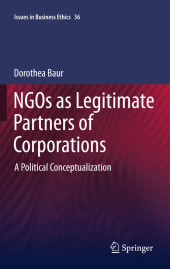 Neuerscheinungen 2013Stand: 2020-01-07 |
Schnellsuche
ISBN/Stichwort/Autor
|
Herderstraße 10
10625 Berlin
Tel.: 030 315 714 16
Fax 030 315 714 14
info@buchspektrum.de |

Dorothea Baur
NGOs as Legitimate Partners of Corporations
A Political Conceptualization
2012. 2013. xxiv, 204 S. 4 Tabellen. 235 mm
Verlag/Jahr: SPRINGER NETHERLANDS; SPRINGER, BERLIN 2013
ISBN: 9400737580 (9400737580)
Neue ISBN: 978-9400737587 (9789400737587)
Preis und Lieferzeit: Bitte klicken
Unlike others on the topic, this book focuses primarily on the role of non-governmental organizations (NGOs), arguing that NGOs can rise above perceived legitimacy deficit to function more effectively as corporate partners than interest groups and activists.
The interaction between corporations and non-governmental organizations (NGOs) has become an important topic in the debate about corporate social responsibility (CSR). Yet, unlike the vast majority of academic work on this topic, this book explicitly focuses on clarifying the role of NGOs, not of corporations, in this context. Based on the notion of NGOs as political actors it argues that NGOs suffer from a multiple legitimacy deficit: they are representatives of civil society without being elected; the legitimacy of the claims they raise is often controversial; and there are often doubts regarding the legitimacy of the behaviour they exhibit in putting forward their claims. Set against an extended sphere of political action in the postnational constellation this book argues that the political model of deliberative democracy provides a meaningful conceptualization of NGOs as legitimate partners of corporations and it develops a conceptual framework that specifically allows distinguishing legitimate partner NGOs from two related actor types with whom they share certain characteristics but who differ with respect to their legitimacy. These related actor types are interest groups on the one hand and activists on the other hand. In conclusion it argues that a focus on the behaviour of NGOs is most meaningful for distinguishing them from interest groups and activists.
Introduction.- The problem.- How do corporations choose their partner NGO?.- Outline and methodology.- Part I Getting to the core.- 1. NGOs as representatives of public claims.- Part II Actors: Civil society and NGOs in the postnational constellation.- 2. The postnational constellation: A broad conception of democracy.- 3. Normative orientation from political theory.- 4. Civil Society: Coming to grips with an elusive term.- 5. Insights from Part II.- Part III Institutions and processes: A normative framework for legitimate partner NGOs.- 6. The public sphere.- 7.Public reason.- 8. The political process.- 9. Legitimacy.- 10. Insights from Part III.- Part IV Drawing a typology for legitimate partner NGOs.- 11. NGOs, interest groups and activists.- 12. Substantive characteristics of legitimate partner NGOs.- 13. Structural characteristics of legitimate partner NGOs.- 14. Procedural characteristics of legitimate partner NGOs.- 15. Insights from Part IV.- 16. Concluding remarks: Normative guidelines for conceptualizing NGOs as legitimate partners of corporations and future implications.- Political-theoretical guidelines.- Rights and duties of legitimate partner NGOs.- Future implications.- Bibliography.- Index.


